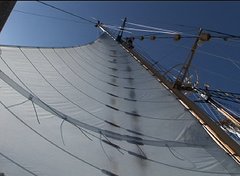From the
beautiful paradise of Palmyra to the enjoyment of sailing it is easy to forget
we are on the Seamans for a reason – we are sailing for science. It is that
extra motivation we all need to get up at late at night and set up for a
station and it is that driving force behind every mile we jet past. Yet science
on a boat, especially a sailboat, looks remarkably different from science on
land.
Stuffy
white lab coats are frequently replaced by bathing suits, high tech tanks are
constructed mainly of colorful zip-ties and luck, and doing hundred counts on
the microscope is a full-contact sport. I hadn’t quite appreciated how well
adapted I was to the moving lab space until we anchored in Palmyra and the
world stopped moving. I sat down in the lab the first morning we were anchored
and positioned myself as usual – petri dish taped in place, knees locked in a
knee-bar (for all the non-climbers, picture entrapping your legs in such a way
that it keeps you from rocking), one hand bracing the microscope keeping the
eyepiece a safe distance from my face, and another hand poised ready to switch
between dropper, forceps, and pencil at the turn of a dime. These precautions
seem excessive at best but time at sea has taught me what it takes to keep the
pteropods in the petri dish and not in my lap. This seemingly awkward position
came naturally to me as I sat down at Palmya after 10 days of working with the
motions of a moving ship.
Yet as I
sat and started working through my sample I realized my knees were not
suffering their usual bruising, my hand could relax from the microscope without
the instrument becoming an impalement hazard, and I could count my species with
an ease I had never before experienced on the ship. While I might have been a
bit more productive when I didn’t have to fight my microscope every roll, I
would never give up the fun we have making science work (and occasionally not
work) on a moving vessel.
From
masking tape, to zip ties, to using the roll of the ship to help swirl down for
pteropods, MacGyver would be proud of the perseverance and creativity in the
science lab. It’s not always pretty, and it’s definitely not always easy, but
it is always fun.
Until next time – we continue to sail for science!
-Anja Brandon


1 comment:
Thanks for such a detailed description of how you must do simple tasks on a rolling sea!
Post a Comment